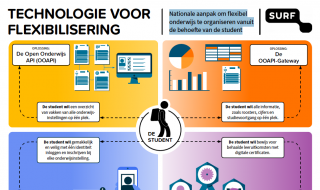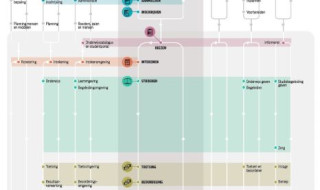Flexible education organisation
Flexible education organisation
How does flexible education benefit the student?
Flexible education is not based on a fixed training program, but is tailored to the wishes and preferences of the student. Students take control of their own educational career and expect optimal facilitation from the institution. There should be as few barriers as possible for students, regardless of their own route and choice of course or institution. It allows students to determine their own learning path and offers them freedom of choice.
Which challenges do institutions face?
Organizing flexible (more) education requires agility from an educational organization. What does this require of the institution and education?
Challenges:
- How do you organise the educational logistic processes to make flexible education possible? Read more about the educational logistic chain
- How do you ensure that students can orientate themselves and register for the educational programs of their own and other institutions? Read more about studentmobility
- How do you organise a simple registration process with one identity?
Read more about eduID - How do you make sure that students can receive digital certificates in a safe and reliable way for their acquired knowledge and experience? Read more about edubadges
What does SURF do to support flexible educational processes?
Student mobility
To give students insight into the educational offerings of all institutions, SURF, together with institutions and national chain partners, Studielink, DUO and RIO, is developing an infrastructure that supports student mobility and lifelong development. The pilot Studentmobility of the Versnellingsplan which started the end of 2021.
A basic facility is available to relieve institutions of the administrative burden: SURFeduhub. This allows institutions to exchange the necessary education data and (personal) data in a secure and reliable manner to enable student mobility. SURF will also develop standards and make agreements at national and international level to ensure that the exchange of information across institutions becomes possible.
Student identity
To facilitate location-independent education, it is desirable that students are uniquely identifiable across institutions. This way, different institutions can be sure that they are dealing with the same student. Within SURF we investigate whether 1 student identity, a eduID, that can help realise the wishes of educational institutions, courses and students. This also requires technical preconditions and legal and administrative agreements.
Digital certification
SURF is working on an edubadge infrastructure to enable micro-credentialing with digital certification. As an institution, you can then digitally certify your offering in smaller units, with the result that students receive digital certificates for successfully completing these smaller units. SURF provides the service edubadges. This service can also be used within the pilot Microcredentials of the Versnellingsplan.

SURF is working on a national approach to organising flexible education from the needs of students. The infographic shows from the perspective of students what wishes they have and what solutions SURF has to provide the desired flexibility.
Process plate from the student's perspective

By starting from the student's perspective, it is possible to see which educational processes are connected, so that consequences of choices for the design of processes become clear. Use the process map to get started with your institution.